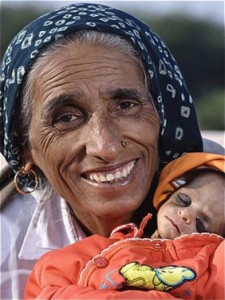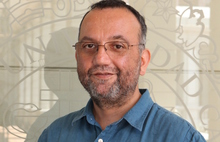La posibilidad de extender la vida reproductiva de los seres humanos es algo que sin duda determinaría cambios significativos en nuestros procesos como especie dentro del planeta. Desde la fecundación in vitro, hasta técnicas genéticas de avanzada, son múltiples las contribuciones que la ciencia ha desarrollado para fomentar la natalidad, en un mundo –que por cierto– envejece a gritos. Sin embargo, la creación de un escenario en que la fertilidad vaya por sobre los rangos etarios –biológicamente recomendados para dar a luz– es cuestionable desde la perspectiva bioética. Para algunos científicos y médicos, la fertilidad pareciera no tener límites y gracias al conocimiento sobre la materia y los recursos que se disponen, han hecho posible que mujeres que superan los 60 años puedan quedar embarazadas.

(En 2008 y a sus 70 años, Rajo Devi quedó embarazada de su hijo Naveen).
En términos biológicos, la menopausia marca un precedente que interrumpe la posibilidad de que la mujer pueda concebir un embarazo. Para que esta opción encuentre asidero, se encuentran técnicas como la inseminación y la utilización de fármacos que estabilicen y fortalezcan el útero.
Países como India presentan numerosos casos (proporcionalmente) de mujeres de más de 50 años que han sido o serán madres. Bajo esta situación, existen variadas implicancias que llevan a las parejas a querer ser padres, aun cuando su reloj temporal les dice que no es recomendable, o que de lleno, ni siquiera pueden hacerlo. Dentro de esas variables se encuentra un paradigma religioso, el cual indica que la realización del hombre su efectúa mediante cumpla con la tarea de procrear. En ese escenario, tanto hombres como mujeres en algunos sectores de India, consideran que al generar descendencia reciben niveles de energía superior que los acercan con las divinidades en las cuales depositan sus creencias religiosas. Las leyes, por otro lado, no determinan límites etarios para el embarazo en mujeres mayores de 50 años.
 Para comprender las implicancias bioéticas correspondientes a este tema, la Sociedad de Biología de Chile, conversó con el Dr. Ricardo Moreno, quien es Doctor en Ciencias Biológicas de la Pontificia Universidad Católica de Chile y Licenciado en Ciencias Biológicas en la misma casa de estudios. El Dr. Moreno realizó su Post-Doctorado en Fisiología (UC) especializándose en espermatogénesis, ovogénesis y fecundación en el Oregon Regional Primate Research Center.
Para comprender las implicancias bioéticas correspondientes a este tema, la Sociedad de Biología de Chile, conversó con el Dr. Ricardo Moreno, quien es Doctor en Ciencias Biológicas de la Pontificia Universidad Católica de Chile y Licenciado en Ciencias Biológicas en la misma casa de estudios. El Dr. Moreno realizó su Post-Doctorado en Fisiología (UC) especializándose en espermatogénesis, ovogénesis y fecundación en el Oregon Regional Primate Research Center.
El profesional de las ciencias –actualmente– imparte cursos de pregrado y postgrado en la Facultad de Ciencias Biológicas de la Pontificia Universidad Católica de Chile. Entre los cursos de pregrado se encuentran: Bioética, Reproducción Animal y Biología de la Célula, mientras en postgrado: Comunicación Celular y Señalización en el Desarrollo.
A continuación la entrevista que la Sociedad de Biología de Chile realizó al Dr. Moreno, en torno a la polémica de mujeres sobre los 50 años que quedan embarazadas.
¿Qué opinión le merece el hecho de que mujeres mayores de 50 años, y en un caso especial en India, mayor de 70 años, queden embarazadas?
Primero debo acotar que estos sucesos no se lograron porque fuese posible biológicamente, ya que a los 70 años no se puede tener hijos. Ahora bien, antiguamente en la naturaleza, las expectativas humanas eran cortas y moríamos mucho antes de lo que sucede hoy en día. Eso se debe a que con los avances tecnológicos y científicos hemos ido alargando nuestras expectativas de vida. En los tiempos de Julio César, por ejemplo, no había patologías tales como el Alzheimer, porque las personas morían a los 40 o 50 años, ósea antes de presentar indicios vinculados a patologías propias del envejecimiento. Sin embargo, hay regulaciones biológicas que mantienen una estabilidad en el tiempo, la menopausia es una de ellas.
Por lo general las mujeres llegan a la menopausia entre los 40 y 50 años, lo que llevado al ciclo de vida actual determinará que una mujer de 70 a 80, pasará casi un tercio de su vida sin poder quedar embarazada de manera natural.
¿Cómo una mujer mayor de 50 años logra quedar embarazada?
La medicina reproductiva ha inventado ciertas técnicas para reemplazar lo que hace la biología, y el que mujeres mayores puedan tener hijos se logró gracias a que existan técnicas como la fecundación in vitro. Dichas prácticas no se efectúan utilizando sus propios ovocitos, sino que son donados.
En el caso de los espermatozoides, no es tan drástica la situación, y el hombre puede seguir siendo el padre biológico, ya que produce gametos hasta muy avanzada edad. Pero a medida que pasan los años, el varón pierde la calidad de su esperma y por esa razón la mayoría de estas fecundaciones se realizan con la ayuda de bancos de semen de hombres más jóvenes.
Por otro lado, y una vez que se descongele tanto el ovocito como el espermio, se produce la fecundación in vitro y se procede con el desarrollo temprano del embrión, implantándose en el útero de la mujer (en este caso mayor de 50 años).
¿Cuáles son los riesgos desde el punto de vista Bioético implicados en estos procedimientos?
Esto impone varios riesgos desde el punto de vista médico y bioético.
Si bien una pareja puede desear tener un hijo, esto no implica que no existan consecuencias fisiológicas terribles. Una mujer de 50, 60 o 70 años embarazada, producirá en sí misma una alteración metabólica que su reloj biológico no está apto para enfrentar. El riesgo que tiene de sufrir una preeclampsia o desarrollar diabetes gestacional es mayor a los que enfrentará una mujer bajo los 50, e incluso a los 45.
Si bien la expectativa de vida ha aumentado, hoy en día las personas dependen, cada vez más, de un desarrollo profesional y económico. En ese escenario, se espera que los padres que tendrán hijos vayan a poder cuidarlos. Allí también entra la discusión de ¿qué es un padre?, si el que da a luz o el que cría, o ambos.
Si estos padres ancianos llegasen a morir, y están conscientes de ello, ¿entregarán a su hijo a terceras personas, una vez nacido? Una persona a los 70 años no cuenta con un rango amplio para proyectar una vida con un bebé. Es un privilegio reproductivo tener un hijo, no un derecho, y los seres humanos debemos escuchar a la naturaleza y comprender el desarrollo natural y biológico de nuestro cuerpo.
En estos casos que hay dilemas biológicos, ¿los médicos están facultados para ofrecerle a los pacientes todo tipo de avances, o considera que hay un límite para ello? ¿Si la ciencia no solo puede corregir, sino que potenciar ciertos genes, sería correcto que la medicina le ofreciese a los padres modificaciones en ciertas características en su hijo?
Hay quienes dicen que eso ya se está haciendo, más mi interrogante se dirige a que la ciudadanía y la comunidad médica y científica se plantee si es correcto. Por otro lado, existen corrientes de bioética como el trans-humanismo que promueve que cualquier avance tecnológico, que promueva una mejoría en la especie humana, debe aplicarse, sin cuestionamiento. Muchos de los médicos que hacen esto requieren publicidad y fama mundial, lo más probable es que su consulta crezca y sus ganancias sean considerables.
Salvatore Anatori fue un médico que hizo que una mujer de 60 años diera a luz un bebé, después del suceso se hizo mundialmente famoso. Con esto quiero dejar de manifiesto que hay que tener cuidado con los fines de la medicina reproductiva y el uso de la investigación científica en pro de los intereses personales.
Línea de investigación:
El Dr. Moreno trabaja en entender cómo se logra la fecundación in vitro desde el punto de vista biológico y cómo afecta la contaminación ambiental de los plásticos y diesel en este proceso.
“La contaminación es un factor muy importante dentro del desarrollo de la fecundación in vitro. Todos los compuestos tóxicos flotantes afectan a los espermatozoides y al sistema endocrino”, señala finalmente el Dr. Moreno.
Fuente: Patricio Grunert Alarcón, Todos los derechos reservados. ®
4ID/CONGRESS, Todos los derechos reservados. ®
Para ser reproducida rogamos contactar a: support@4id.cl o patricio@4id.cl.
Citar como fuente a: Patricio Grunert Alarcón.
Dr. Ricardo Moreno, todos los derechos reservados. ®

